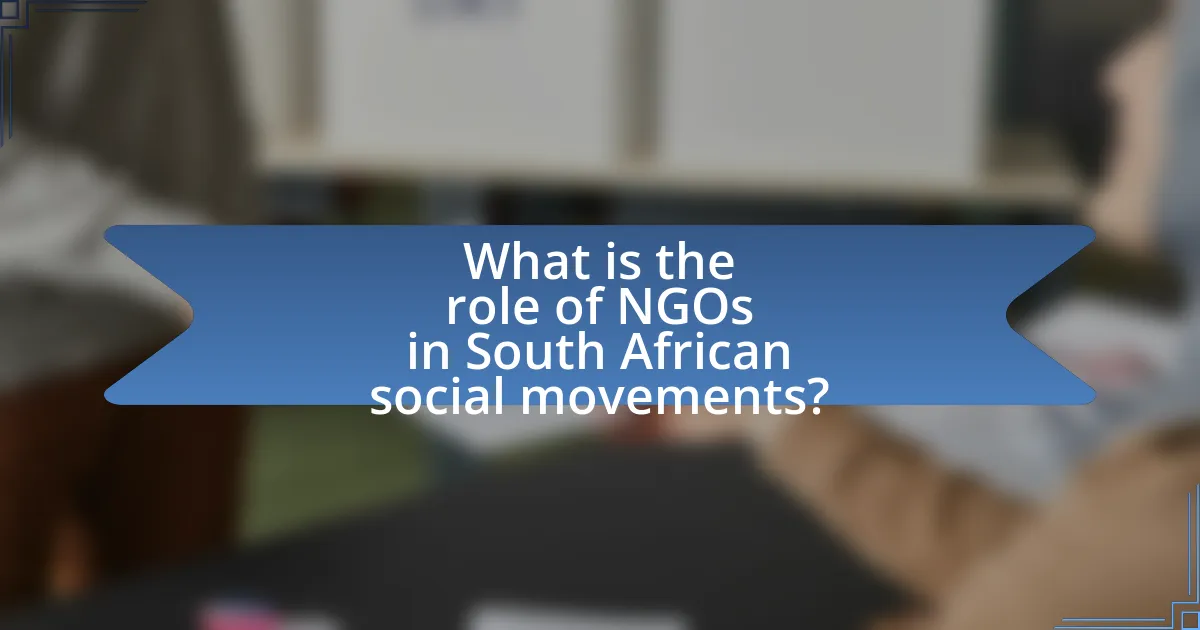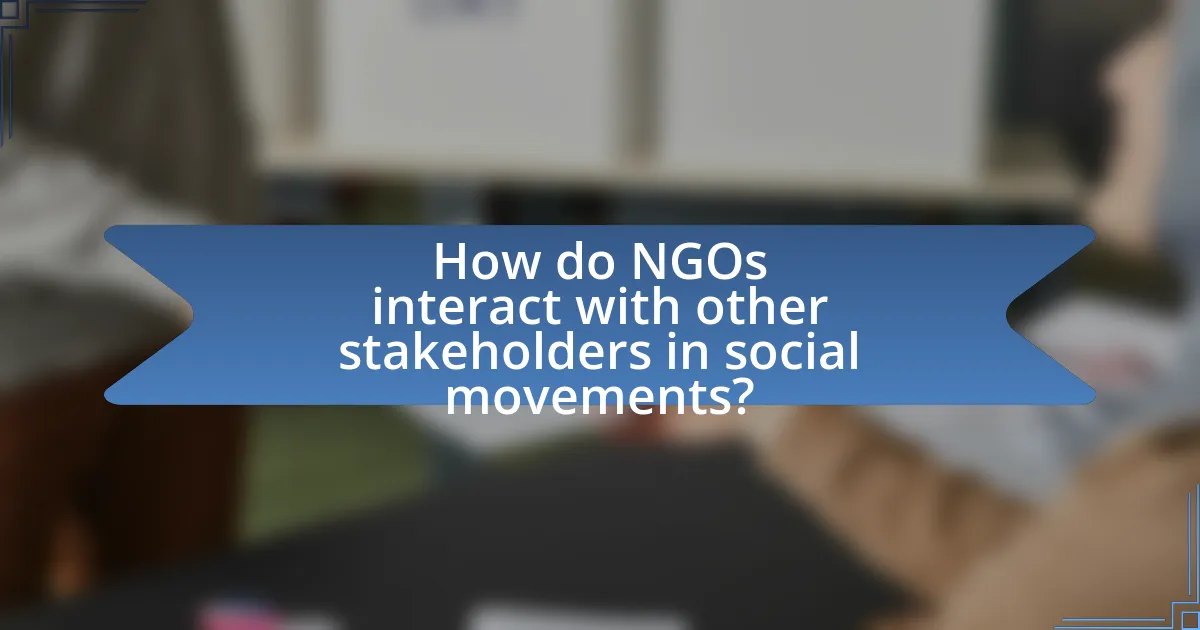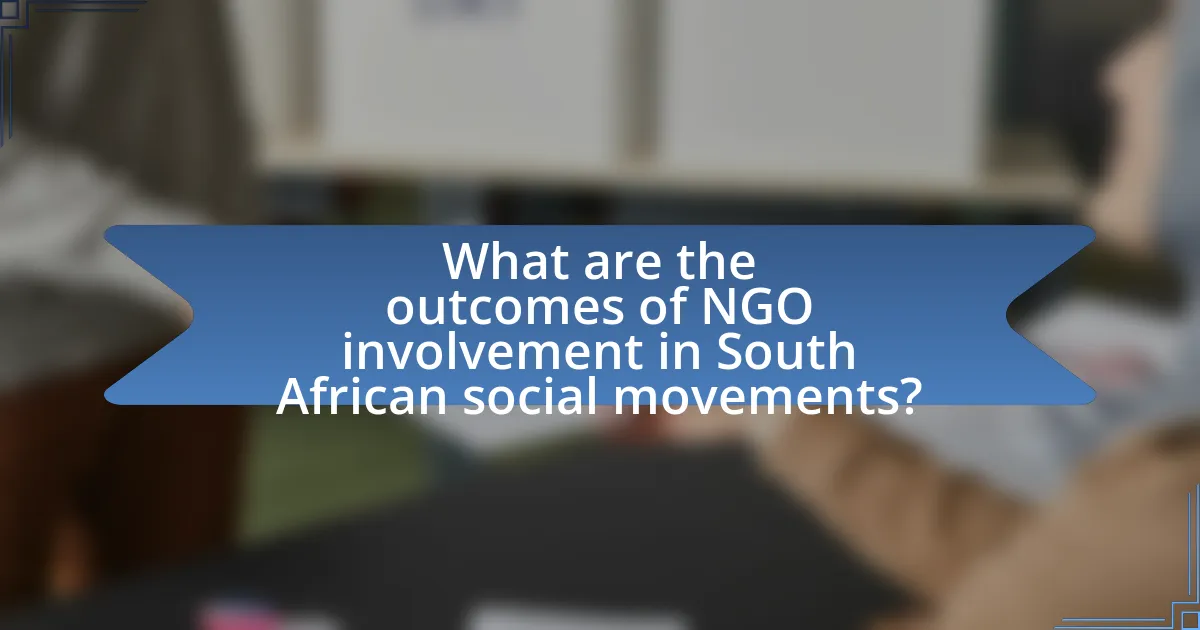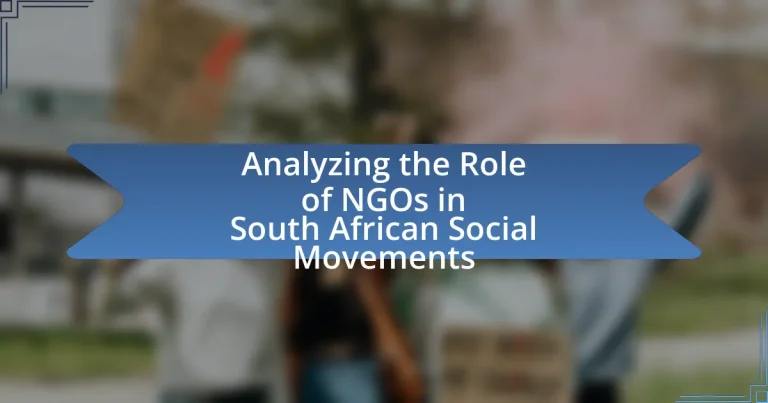The article analyzes the role of non-governmental organizations (NGOs) in South African social movements, highlighting their contributions to advocacy, resource mobilization, and community empowerment. It discusses how NGOs address critical issues such as human rights, social inequality, and public health, exemplified by organizations like the Treatment Action Campaign. The article also examines the historical context of NGOs in South Africa, their evolution post-apartheid, the challenges they face, and their strategies for engaging with grassroots movements and other stakeholders. Additionally, it outlines the outcomes of NGO involvement in social change and offers insights into best practices for enhancing their effectiveness in future social movements.

What is the role of NGOs in South African social movements?
NGOs play a crucial role in South African social movements by providing resources, advocacy, and mobilization support. They facilitate community engagement and empower marginalized groups, often addressing issues such as human rights, environmental justice, and social inequality. For instance, organizations like the Treatment Action Campaign have been instrumental in advocating for access to HIV/AIDS treatment, significantly influencing public health policy. Additionally, NGOs often serve as intermediaries between communities and government, amplifying the voices of those who may otherwise be overlooked in the political process. Their involvement has been pivotal in shaping social change and promoting democratic participation in South Africa.
How do NGOs contribute to social change in South Africa?
NGOs contribute to social change in South Africa by advocating for human rights, providing essential services, and mobilizing communities for social justice. These organizations address issues such as poverty, education, and health care, often filling gaps left by government services. For instance, NGOs like the Treatment Action Campaign have played a crucial role in advocating for access to antiretroviral treatment for HIV/AIDS, significantly impacting public health outcomes. Additionally, NGOs engage in policy advocacy, influencing legislation and promoting accountability, which has led to reforms in areas such as land rights and gender equality. Their efforts are supported by statistics showing that regions with active NGOs experience improved social indicators, highlighting their effectiveness in driving social change.
What specific functions do NGOs serve within social movements?
NGOs serve several specific functions within social movements, including advocacy, resource mobilization, and capacity building. Advocacy involves influencing public policy and raising awareness about social issues, which is crucial for mobilizing support and driving change. Resource mobilization refers to the ability of NGOs to gather financial, human, and informational resources that empower social movements to operate effectively. Capacity building enhances the skills and organizational strength of grassroots movements, enabling them to sustain their efforts over time. For instance, in South Africa, NGOs have played a pivotal role in the anti-apartheid movement by providing legal support, training activists, and facilitating international solidarity, demonstrating their integral role in advancing social justice initiatives.
How do NGOs mobilize communities for social action?
NGOs mobilize communities for social action by employing strategies such as grassroots organizing, awareness campaigns, and capacity building. These organizations engage local populations through workshops, community meetings, and outreach programs that educate individuals about social issues and empower them to take collective action. For instance, NGOs like the Treatment Action Campaign in South Africa have successfully mobilized communities around health issues, leading to significant policy changes and increased access to healthcare services. This approach is supported by evidence showing that community involvement in social movements enhances participation and effectiveness, as seen in various case studies of successful NGO-led initiatives in South Africa.
Why are NGOs important in the context of South African history?
NGOs are important in the context of South African history because they played a crucial role in advocating for human rights and social justice during the apartheid era. These organizations mobilized communities, provided essential services, and raised awareness about the injustices faced by marginalized groups. For instance, the Black Sash, an influential NGO, focused on women’s rights and anti-apartheid activism, while organizations like the Treatment Action Campaign fought for access to HIV/AIDS treatment, significantly impacting public health policy. Their efforts contributed to the eventual dismantling of apartheid and the establishment of a democratic society, highlighting the vital role NGOs have in shaping social movements and influencing policy in South Africa.
What historical events have shaped the role of NGOs in social movements?
The role of NGOs in social movements has been significantly shaped by historical events such as the anti-apartheid struggle in South Africa, the global human rights movement, and the rise of environmental activism. The anti-apartheid movement, particularly from the 1980s, saw NGOs mobilizing both locally and internationally to advocate for racial equality and justice, exemplified by organizations like the Black Sash and the South African Council of Churches. The global human rights movement, particularly after the establishment of the Universal Declaration of Human Rights in 1948, provided a framework for NGOs to address social injustices and advocate for marginalized communities. Additionally, the emergence of environmental movements in the late 20th century, highlighted by events like the 1992 Earth Summit in Rio de Janeiro, allowed NGOs to expand their focus to include ecological issues, further solidifying their role in social movements. These events collectively illustrate how NGOs have evolved to address various social, political, and environmental challenges, thereby becoming integral to social movements.
How have NGOs evolved in response to South Africa’s political landscape?
NGOs in South Africa have evolved significantly in response to the country’s changing political landscape, particularly since the end of apartheid in 1994. Initially, many NGOs focused on anti-apartheid activism and human rights advocacy, but post-apartheid, their roles expanded to include service delivery, community development, and policy advocacy. For instance, organizations like the Treatment Action Campaign emerged to address health issues, particularly HIV/AIDS, reflecting the urgent needs of the population in a new democratic context. Additionally, NGOs have increasingly engaged in partnerships with government and international bodies to influence policy and promote social justice, adapting their strategies to address contemporary challenges such as inequality and corruption. This evolution illustrates the dynamic nature of NGOs as they respond to the socio-political realities of South Africa.
What challenges do NGOs face in South African social movements?
NGOs in South African social movements face significant challenges, including funding constraints, political interference, and community distrust. Funding limitations hinder their ability to sustain operations and implement programs effectively, as many rely on external donors whose priorities may not align with local needs. Political interference often manifests through government resistance to NGO activities, particularly when these organizations advocate for social justice or human rights, leading to potential harassment or legal obstacles. Additionally, community distrust can arise from perceptions that NGOs are disconnected from local realities or driven by foreign agendas, which complicates their efforts to mobilize grassroots support. These challenges collectively impact the effectiveness and sustainability of NGOs in driving social change within South Africa.
How do funding issues impact the effectiveness of NGOs?
Funding issues significantly hinder the effectiveness of NGOs by limiting their operational capacity and program implementation. When NGOs face financial constraints, they often struggle to maintain staff, deliver services, and execute projects, which directly affects their ability to address social issues. For instance, a study by the Southern Africa Trust in 2020 highlighted that 70% of NGOs in South Africa reported reduced funding, leading to a 40% decrease in service delivery effectiveness. This financial instability can also result in a lack of sustainability, as NGOs may be forced to rely on short-term projects rather than long-term solutions, ultimately undermining their impact on social movements.
What are the barriers to collaboration between NGOs and local communities?
Barriers to collaboration between NGOs and local communities include mistrust, differing priorities, and lack of communication. Mistrust often arises from past experiences where NGOs may have failed to deliver on promises, leading communities to be skeptical of their intentions. Differing priorities can occur when NGOs focus on broader goals that do not align with the immediate needs of local communities, creating a disconnect. Additionally, lack of communication can hinder collaboration, as NGOs may not effectively engage with community members to understand their perspectives and needs. These barriers can significantly impede the effectiveness of social movements in South Africa, as highlighted in various studies on NGO-community interactions.

How do NGOs interact with other stakeholders in social movements?
NGOs interact with other stakeholders in social movements through collaboration, advocacy, and capacity building. These organizations often partner with grassroots groups, government entities, and private sector actors to amplify their impact and reach. For instance, in South Africa, NGOs like the Treatment Action Campaign have worked alongside community organizations and health departments to address public health issues, demonstrating effective collaboration. Additionally, NGOs engage in advocacy efforts to influence policy changes by mobilizing public support and leveraging their networks, as seen in campaigns for social justice and human rights. Capacity building initiatives further enhance the skills and resources of local stakeholders, fostering a more unified approach to social change.
What partnerships do NGOs form to enhance their impact?
NGOs form partnerships with various stakeholders, including government agencies, private sector organizations, and other civil society groups, to enhance their impact. These collaborations enable NGOs to leverage resources, share expertise, and amplify their advocacy efforts. For instance, partnerships with government entities can facilitate access to funding and policy influence, while alliances with businesses can provide financial support and innovative solutions to social issues. Additionally, collaborating with other NGOs allows for a pooling of knowledge and resources, which can lead to more effective program implementation and broader outreach. Such strategic partnerships are essential for NGOs to address complex social challenges and achieve sustainable outcomes in South African social movements.
How do NGOs collaborate with government entities?
NGOs collaborate with government entities through partnerships, funding agreements, and policy advocacy. These collaborations often involve NGOs providing expertise and resources to support government initiatives, particularly in areas like health, education, and social services. For instance, in South Africa, NGOs have worked with the government to implement programs aimed at combating HIV/AIDS, leveraging their on-the-ground experience to enhance public health strategies. This partnership model is supported by the South African government’s recognition of the critical role NGOs play in service delivery, as evidenced by the National Development Plan, which emphasizes collaboration with civil society to achieve developmental goals.
What role do international organizations play in supporting South African NGOs?
International organizations play a crucial role in supporting South African NGOs by providing funding, capacity-building, and advocacy resources. These organizations, such as the United Nations and various international foundations, offer financial assistance that enables NGOs to implement social programs and initiatives effectively. For instance, the Global Fund has invested millions in health-related projects in South Africa, directly benefiting local NGOs focused on HIV/AIDS and tuberculosis. Additionally, international organizations facilitate training and development programs that enhance the operational capabilities of South African NGOs, ensuring they can address local challenges more effectively. Furthermore, they advocate for policy changes at national and international levels, amplifying the voices of South African NGOs in critical social issues.
How do NGOs engage with grassroots movements?
NGOs engage with grassroots movements by providing resources, training, and advocacy support to enhance local initiatives. For instance, NGOs often facilitate capacity-building workshops that empower community leaders with skills in organization, mobilization, and advocacy, which strengthens grassroots efforts. Additionally, NGOs may offer financial assistance or access to networks that amplify the voices of grassroots movements, enabling them to reach broader audiences and influence policy changes. Research indicates that such collaborations can lead to more effective social change, as seen in various South African social movements where NGOs have played a pivotal role in mobilizing communities around issues like land reform and social justice.
What strategies do NGOs use to empower local activists?
NGOs empower local activists through capacity building, resource provision, and advocacy support. Capacity building involves training programs that enhance skills in leadership, organization, and mobilization, enabling activists to effectively engage their communities. Resource provision includes financial support, access to information, and tools necessary for grassroots initiatives, which strengthens local movements. Advocacy support involves helping activists amplify their voices in policy discussions, ensuring their concerns are represented in broader social movements. For instance, organizations like the Treatment Action Campaign have successfully mobilized local activists to advocate for health rights, demonstrating the effectiveness of these strategies in South Africa.
How do NGOs ensure that marginalized voices are heard in social movements?
NGOs ensure that marginalized voices are heard in social movements by actively engaging with these communities, facilitating their participation, and amplifying their concerns. They conduct outreach programs to identify and connect with marginalized groups, ensuring that their perspectives are included in advocacy efforts. For instance, NGOs often organize workshops and forums that provide a platform for these voices, allowing them to share their experiences and needs directly with policymakers and the public. Research indicates that NGOs play a crucial role in bridging the gap between marginalized communities and decision-makers, as seen in South Africa’s social movements where organizations like the Treatment Action Campaign have successfully mobilized community voices to influence health policy. This approach not only empowers marginalized individuals but also enhances the legitimacy and effectiveness of social movements by ensuring diverse representation.

What are the outcomes of NGO involvement in South African social movements?
NGO involvement in South African social movements has led to increased advocacy for human rights, improved community mobilization, and enhanced access to resources. These organizations have played a crucial role in raising awareness about social issues, such as poverty and inequality, which has resulted in policy changes and greater governmental accountability. For instance, NGOs like the Treatment Action Campaign have successfully influenced public health policies, leading to expanded access to HIV/AIDS treatment. Additionally, NGOs have facilitated grassroots organizing, empowering local communities to voice their concerns and demand change, thereby strengthening democratic processes in the country.
How do NGOs measure their impact on social change?
NGOs measure their impact on social change through a combination of quantitative and qualitative methods. These methods include collecting data on specific indicators such as changes in community health, education levels, and economic conditions, which are often assessed through surveys and statistical analysis. For instance, a study by the World Bank indicated that NGOs that track health outcomes can demonstrate a direct correlation between their interventions and improved health metrics in communities. Additionally, NGOs often conduct case studies and gather testimonials to provide qualitative evidence of their impact, showcasing personal stories that illustrate the broader social changes achieved. This dual approach allows NGOs to present a comprehensive view of their effectiveness in driving social change.
What indicators are used to assess the success of NGO initiatives?
Indicators used to assess the success of NGO initiatives include measurable outcomes such as the number of beneficiaries served, changes in community well-being, and the achievement of specific project goals. These indicators provide quantifiable data that reflect the effectiveness of the NGO’s programs. For instance, a study by the World Bank highlights that successful NGOs often track metrics like increased access to education or healthcare, which directly correlate with improved quality of life in communities. Additionally, stakeholder feedback and sustainability of initiatives are critical indicators, as they demonstrate the long-term impact and community engagement in the NGO’s efforts.
How do success stories from NGOs influence public perception?
Success stories from NGOs significantly enhance public perception by showcasing tangible impacts and fostering trust in their initiatives. When NGOs effectively communicate their achievements, such as successful community projects or improved social outcomes, they create a narrative that resonates with the public, leading to increased support and engagement. For instance, a study by the International Journal of Nonprofit and Voluntary Sector Marketing found that positive media coverage of NGO success stories correlates with higher public donations and volunteerism. This demonstrates that successful outcomes not only validate the NGOs’ missions but also influence public attitudes, encouraging a more favorable view of their role in social movements.
What lessons can be learned from the experiences of NGOs in South Africa?
The experiences of NGOs in South Africa highlight the importance of community engagement and adaptability in addressing social issues. NGOs have demonstrated that successful interventions require understanding local contexts and building trust with communities, as seen in initiatives focused on health and education. For instance, the Treatment Action Campaign effectively mobilized communities to advocate for access to antiretroviral treatment during the HIV/AIDS crisis, showcasing the power of grassroots activism. Additionally, NGOs have learned the necessity of collaboration with government and other stakeholders to enhance their impact, as evidenced by partnerships formed during the implementation of the National Development Plan. These lessons emphasize that effective NGO strategies must be rooted in local realities and foster collaborative relationships to drive meaningful change.
What best practices can NGOs adopt to enhance their effectiveness?
NGOs can enhance their effectiveness by adopting a strategic approach that includes clear goal-setting, stakeholder engagement, and data-driven decision-making. Clear goal-setting allows NGOs to define specific, measurable objectives that align with their mission, ensuring focused efforts. Engaging stakeholders, including community members and local organizations, fosters collaboration and builds trust, which is essential for successful implementation of initiatives. Data-driven decision-making enables NGOs to assess their impact and adapt strategies based on evidence, improving overall effectiveness. For instance, a study by the International NGO Training and Research Centre highlights that NGOs that utilize performance metrics are 30% more likely to achieve their objectives compared to those that do not.
How can NGOs better navigate challenges in future social movements?
NGOs can better navigate challenges in future social movements by adopting adaptive strategies that enhance their responsiveness and engagement with communities. This involves actively listening to the needs and concerns of the communities they serve, which can be facilitated through regular consultations and participatory approaches. For instance, research indicates that NGOs that prioritize community involvement in decision-making processes are more effective in mobilizing support and resources, as seen in the successful campaigns led by organizations like the Treatment Action Campaign in South Africa, which effectively addressed public health issues by engaging local communities. Additionally, leveraging technology for communication and advocacy can help NGOs reach broader audiences and coordinate efforts more efficiently, as demonstrated by the use of social media platforms during the #FeesMustFall movement, which mobilized thousands of students across the country. By focusing on these strategies, NGOs can enhance their effectiveness and resilience in the face of evolving social challenges.
What practical steps can NGOs take to improve their role in social movements?
NGOs can improve their role in social movements by actively engaging with communities to understand their needs and priorities. This involves conducting regular consultations and participatory assessments to gather insights directly from the affected populations. For instance, the South African NGO sector has seen success when organizations like the Treatment Action Campaign mobilized community voices to advocate for HIV/AIDS treatment access, demonstrating the effectiveness of grassroots involvement. Additionally, NGOs should collaborate with local leaders and other stakeholders to build coalitions that amplify their advocacy efforts, as seen in the successful campaigns for social justice in South Africa. By leveraging data and evidence-based approaches, NGOs can also strengthen their arguments and influence policy changes, as evidenced by the impact of research-driven advocacy in the fight against apartheid.


